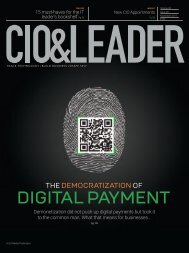white_paper_on_data_protection_in_india_171127_final_v2
You also want an ePaper? Increase the reach of your titles
YUMPU automatically turns print PDFs into web optimized ePapers that Google loves.
Privacy is a complex c<strong>on</strong>cept that has been difficult to def<strong>in</strong>e. In many circumstances, the<br />
harms that arise from violati<strong>on</strong>s of privacy are difficult to identify because very often they are<br />
<strong>in</strong>tangible. Despite its amorphous nature, there are a number of reas<strong>on</strong>s why protect<strong>in</strong>g<br />
privacy is c<strong>on</strong>sidered valuable. The protecti<strong>on</strong> of privacy permits <strong>in</strong>dividuals to plan and<br />
carry out their lives without unnecessary <strong>in</strong>trusi<strong>on</strong>. 26 Informati<strong>on</strong>al privacy is often<br />
understood as the freedom of <strong>in</strong>dividuals ―to determ<strong>in</strong>e for themselves when, how, and to<br />
what extent <strong>in</strong>formati<strong>on</strong> about them is communicated to others‖ 27 and this freedom allows for<br />
<strong>in</strong>dividuals to protect themselves from harm. However, not all <strong>in</strong>formati<strong>on</strong> about an<br />
<strong>in</strong>dividual is necessarily private and deserv<strong>in</strong>g of protecti<strong>on</strong>. It is for a legal framework to<br />
determ<strong>in</strong>e where afford<strong>in</strong>g such freedom is appropriate and where it is not.<br />
Certa<strong>in</strong> aspects related to an <strong>in</strong>dividual are c<strong>on</strong>sidered especially central to their identity, such<br />
as their bodies, their sexuality, or their ability to develop their own dist<strong>in</strong>ct pers<strong>on</strong>alities. 28<br />
Privacy is also valued where it legitimately protects an <strong>in</strong>dividual‘s reputati<strong>on</strong>. Disclosure of<br />
certa<strong>in</strong> k<strong>in</strong>ds of <strong>in</strong>flammatory and sensitive <strong>in</strong>formati<strong>on</strong>, even where the <strong>in</strong>formati<strong>on</strong> is true,<br />
unfairly results <strong>in</strong> the stereotyp<strong>in</strong>g and pre-judg<strong>in</strong>g of <strong>in</strong>dividual. 29 In some circumstances,<br />
<strong>in</strong>formati<strong>on</strong> about an <strong>in</strong>dividual (such as their race, religi<strong>on</strong>, caste etc.) can be used to<br />
discrim<strong>in</strong>ate aga<strong>in</strong>st them. There are also some acti<strong>on</strong>s of the state which may threaten an<br />
<strong>in</strong>dividual‘s privacy. For <strong>in</strong>stance, surveillance activities by government or private<br />
organisati<strong>on</strong>s can disrupt peace of m<strong>in</strong>d and create chill<strong>in</strong>g effects by mak<strong>in</strong>g people c<strong>on</strong>form<br />
to societal expectati<strong>on</strong>s. 30<br />
However, it is not possible to c<strong>on</strong>clusively demarcate all the aspects requir<strong>in</strong>g protecti<strong>on</strong> <strong>in</strong><br />
this manner as the relevant c<strong>on</strong>cerns arise <strong>in</strong> vary<strong>in</strong>g c<strong>on</strong>texts. Privacy does not arise <strong>on</strong>ly <strong>in</strong><br />
some special, unchang<strong>in</strong>g space like the home or the family but also <strong>in</strong> various situati<strong>on</strong>s<br />
<strong>in</strong>clud<strong>in</strong>g <strong>in</strong> public spaces. Different norms of privacy can exist <strong>in</strong> different spheres of life. 31<br />
For example, an <strong>in</strong>dividual may be will<strong>in</strong>g to disclose certa<strong>in</strong> th<strong>in</strong>gs to a doctor or<br />
psychologist that she would not even tell her spouse or friends. Rules of <strong>data</strong> protecti<strong>on</strong> and<br />
privacy are designed <strong>in</strong> such a way that they allow <strong>in</strong>dividuals the freedom to determ<strong>in</strong>e how<br />
their pers<strong>on</strong>al <strong>in</strong>formati<strong>on</strong> will be collected, used and disclosed. This is because <strong>in</strong>dividuals<br />
themselves are best equipped to understand how they will be benefited or harmed <strong>in</strong> the many<br />
unique c<strong>on</strong>texts which <strong>in</strong>volve their pers<strong>on</strong>al <strong>in</strong>formati<strong>on</strong>.<br />
Privacy laws are not identical <strong>in</strong> form to any other exist<strong>in</strong>g fields of law like property,<br />
copyright or tort law, though there are some similarities. 32 For example, laws <strong>on</strong> defamati<strong>on</strong><br />
26 Time, Inc. v. Hill, 385 U.S. 374, 413 (1967) (Fortas, J., dissent<strong>in</strong>g); Doe v. Bolt<strong>on</strong>, 410 U.S. 179, 213 (1973)<br />
(Douglas, J., c<strong>on</strong>curr<strong>in</strong>g)<br />
27 Alan West<strong>in</strong>, ‗Privacy and Freedom‘, 7, (Atheneum, 1967).<br />
28 Stanley I. Benn, ‗Privacy, Freedom, and Respect for Pers<strong>on</strong>s,‘ <strong>in</strong> ‗Nomos XIII: Privacy‘, 26 (J. R<strong>on</strong>ald<br />
Pennock and J.W. Chapman eds., 1971).<br />
29 Jeffrey Rosen, ‗The Unwanted Gaze: The Destructi<strong>on</strong> of Privacy <strong>in</strong> America‘ (Random House, 2000).<br />
30 Neil M. Richards, ‗The Dangers of Surveillance,‘ 126 (7) Harvard Law Review 1934, 1950 (20 May 2013).<br />
31 Helen Nissenbaum, ‗Privacy as C<strong>on</strong>textual Integrity‘, 79 Wash<strong>in</strong>gt<strong>on</strong> Law Review 119 (2004).<br />
32 Daniel Solove, ‗C<strong>on</strong>ceptualiz<strong>in</strong>g Privacy‘, 90 (4) California Law Review 1088-89, 1100-02, 1112-13, 1130-<br />
31, (July 2002).<br />
5














